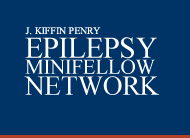




 |
|||||
 |
 |
 |
 |
||
|
|
|
|
|
History & Mission
HISTORY The week-long MiniFellowship Programs have been offered every year since the pilot program in 1986. As the MiniFellowship program thrived, Dr. Penry saw a need for other types of educational courses. In 1987, he began the Advances in Epilepsy Programs, weekend courses for neurologists who cannot take the time for the week-long program or who see fewer epilepsy patients. He also saw a need to educate non-neurologists and paraprofessionals in institutional settings who treat epilepsy patients with multiple handicaps and developmental disabilities. Thus began the Advances in Epilepsy MRDD Programs, which are specifically designed for physicians caring for the developmentally disabled population. Combined, there have been over 30 Advances in Epilepsy Programs since 1987. Shortly thereafter, the Residents Epilepsy Program was established. In addition to providing the neurology resident with the latest information on the diagnosis and treatment of epilepsy, this program seeks to increase the resident’s interest in treating patients with epilepsy, and encourage them to pursue epilepsy fellowships. To date, 47 sessions of the Residents Program in Epilepsy have been held since its inception in 1990. Each year, the program's attendance goal is to host at least one resident from each neurology residency program in the country. Participation in the Residents Program is through private invitation, determined in consultation with the various residency directors. In response to a growing demand for programs specifically focused on treating epilepsy in children and adolescents, a new series of programs were developed specifically for those who care for this special population with support from UCB. The J. Kiffin Penry Pediatric Epilepsy Programs offer programs for both residents and practicing child neurologists. All of the programs offered through the J. Kiffin Penry Epilepsy Education Programs are uniquely structured to facilitate learning through lectures, group discussions, and case-study workshops. Overall more than 4000 physicians, approximately one of every five neurologists in the United States, have attended one or more programs.After Dr. J. Kiffin Penry's passing in March 1996, an advisory board was formed comprised of long-term guest faculty of the Epilepsy MiniFellowship Programs. The Advisory Board is dedicated to sustaining Dr. Penry's vision with these unique educational programs. ABOUT OUR FOUNDER |